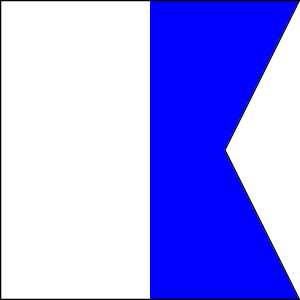Spelling alphabet
Spelling alphabet
A spelling alphabet, also known as a phonetic alphabet, is a set of words used to stand for the letters of an alphabet in oral communication. Each word in the spelling alphabet typically starts with the letter it represents. This system is used to ensure clarity and avoid misunderstandings, especially in situations where audio quality is poor or when communicating over radio or telephone.
History[edit | edit source]
The concept of a spelling alphabet dates back to the early 20th century. The International Telecommunication Union (ITU) and the International Civil Aviation Organization (ICAO) developed the most widely recognized spelling alphabet, known as the NATO phonetic alphabet. This alphabet was adopted in 1956 and is still in use today.
NATO Phonetic Alphabet[edit | edit source]
The NATO phonetic alphabet is the most commonly used spelling alphabet. It consists of 26 code words, each representing a letter of the English alphabet:
- A - Alpha
- B - Bravo
- C - Charlie
- D - Delta
- E - Echo
- F - Foxtrot
- G - Golf
- H - Hotel
- I - India
- J - Juliett
- K - Kilo
- L - Lima
- M - Mike
- N - November
- O - Oscar
- P - Papa
- Q - Quebec
- R - Romeo
- S - Sierra
- T - Tango
- U - Uniform
- V - Victor
- W - Whiskey
- X - X-ray
- Y - Yankee
- Z - Zulu
Usage[edit | edit source]
Spelling alphabets are used in various fields, including aviation, military, emergency services, and telecommunications. They help to avoid confusion caused by similar-sounding letters, such as "B" and "D" or "M" and "N".
Other Spelling Alphabets[edit | edit source]
While the NATO phonetic alphabet is the most widely used, other organizations and countries have developed their own spelling alphabets. For example, the American Radio Relay League (ARRL) uses a different set of code words for amateur radio communication.
Related Pages[edit | edit source]
- NATO phonetic alphabet
- International Civil Aviation Organization
- International Telecommunication Union
- Aviation
- Military
- Emergency services
- Telecommunications
This communication related article is a stub. You can help WikiMD by expanding it.
Search WikiMD
Ad.Tired of being Overweight? Try W8MD's physician weight loss program.
Semaglutide (Ozempic / Wegovy and Tirzepatide (Mounjaro / Zepbound) available.
Advertise on WikiMD
|
WikiMD's Wellness Encyclopedia |
| Let Food Be Thy Medicine Medicine Thy Food - Hippocrates |
Translate this page: - East Asian
中文,
日本,
한국어,
South Asian
हिन्दी,
தமிழ்,
తెలుగు,
Urdu,
ಕನ್ನಡ,
Southeast Asian
Indonesian,
Vietnamese,
Thai,
မြန်မာဘာသာ,
বাংলা
European
español,
Deutsch,
français,
Greek,
português do Brasil,
polski,
română,
русский,
Nederlands,
norsk,
svenska,
suomi,
Italian
Middle Eastern & African
عربى,
Turkish,
Persian,
Hebrew,
Afrikaans,
isiZulu,
Kiswahili,
Other
Bulgarian,
Hungarian,
Czech,
Swedish,
മലയാളം,
मराठी,
ਪੰਜਾਬੀ,
ગુજરાતી,
Portuguese,
Ukrainian
Medical Disclaimer: WikiMD is not a substitute for professional medical advice. The information on WikiMD is provided as an information resource only, may be incorrect, outdated or misleading, and is not to be used or relied on for any diagnostic or treatment purposes. Please consult your health care provider before making any healthcare decisions or for guidance about a specific medical condition. WikiMD expressly disclaims responsibility, and shall have no liability, for any damages, loss, injury, or liability whatsoever suffered as a result of your reliance on the information contained in this site. By visiting this site you agree to the foregoing terms and conditions, which may from time to time be changed or supplemented by WikiMD. If you do not agree to the foregoing terms and conditions, you should not enter or use this site. See full disclaimer.
Credits:Most images are courtesy of Wikimedia commons, and templates Wikipedia, licensed under CC BY SA or similar.
Contributors: Prab R. Tumpati, MD







